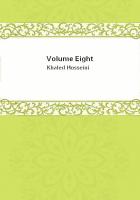Plato, Aristotle, and the Stoics, only regarded, in their account of virtue, that part of it which consists in propriety of conduct. According to Plato, the soul was composed of three different facultiesreason, passion, and appetite; and that higher form of justice which constitutes perfect virtue was nothing more than that state of mind in which every faculty confined itself to its proper sphere, without encroaching upon that of any other, and performed its office with precisely that degree of strength which belonged to it. In other words, this justice, the last and greatest of the cardinal virtues, and that which comprehended all the others, meant that exact and perfect propriety of conduct, the nature of which has been already discussed. Nearly the same account of virtue was given by Aristotle, who defined it as the habit of moderation in accordance with right reason;by which he meant a right affection of mind towards particular objects, as in being neither too much nor too little affected by objects of fear.
And the Stoics so far coincided with Plato and Aristotle as to place perfect virtue, or rectitude of conduct, in a proper choice or rejection of different objects and circumstances according as they were by nature rendered more or less the objects of our desire or aversion. In this propriety of the mind towards external things consisted the life according to nature, or in other words, the virtuous conduct of life.
No less incomplete than systems which placed virtue in propriety alone were those systems which placed it in prudence, or in a prudential regard for mere personal welfare. Such were the systems of the Cyrenaics and Epicureans in ancient times, and of writers like Hobbes and Mandeville in modern times.
According to Epicurus, the goodness or badness of anything was ultimately referable to its tendency to produce bodily pleasure or pain. Thus power and riches were desirable as good things, from their tendency to procure pleasure, whilst the evil of the contrary conditions lay in their close connexion with pain. Honour and reputation were of value, because the esteem of others was of so much importance to procure us pleasure and to defend us from pain. And in the same way the several virtues were not desirable simply for themselves, but only by reason of their intimate connexion with our greatest well-being, ease of body and tranquillity of mind. Thus temperance was nothing but prudence with regard to pleasure, the sacrifice of a present enjoyment to obtain a greater one or to avoid a greater pain. Courage was nothing but prudence with regard to danger or labour, not good in itself, but only as repellent of some greater evil. And justice too was nothing but prudence with regard to our neighbours, a means calculated to procure their esteem, and to avoid the fear that would flow from their resentment.
Adam Smith's first reply to this theory is, that whatever may be the tendency of the several virtues or vices, the sentiments which they excite in others are the objects of a much more passionate desire or aversion than all their other con- sequences; that to be-amiable and the proper object of esteem is of more value to us than all the ease and security which love or esteem can procure us: and that to be odious, or the proper object of contempt, or indignation is more dreadful than all we can suffer in our body from hatred, contempt, or indignation; and that therefore our desire of the one character and our aversion to the other cannot arise from regard to the effects which either of them is likely to produce on the body.
Secondly, there is one aspect of nature from which the Epicurean system derives its plausibility. "By the wise contrivance of the Author of nature, virtue is upon all ordinary occasions, even with regard to this life, real wisdom, and the surest and readiest means of obtaining both safety and advantage." The success or failure of our undertakings must very much depend on the good or bad opinion entertained of us, and on the general disposition of others to assist or oppose us. Hence the tendency of virtue to promote our interest and of vice to obstruct it, undoubtedly stamps an additional beauty and propriety upon the one, and a fresh deformity and im propriety upon the other. And thus temperance, magnanimity, justice and beneficence, come to be approved of, not only under their proper characters, but under the additional character of the most real prudence and the highest wisdom;whilst the contrary vices come to be disapproved of; not only under their proper characters, but under the additional character of the most short-sighted folly and weakness. So that the conduciveness of virtue to happiness is only secondary, and so to speak accidental to its character; it is not its first recommendation to our pursuit of it.
But if the theories which resolved virtue into propriety or prudence were thus one-sided, the remaining theorythat best represented by Hutchesonwas no less so, which made virtue to consist solely in benevolence, or in a disinterested regard to the good of others or the public generally. So far indeed did Hutcheson carry this theory, that he even rejected as a selfish motive to virtuous action the pleasure of self-approbation, "the comfortable applause of our own consciences," holding that it diminished the merit of any benevolent action. The principle of self-love could never be virtuous in any degree, and it was merely innocent, not good, when it led a man to act from a reasonable regard to his own happiness.
Several reasons seem, indeed, at first sight, to justify the identification of virtue with benevolence. It is the most agreeable of all the affections.
It is recommended to us by a double sympathy, and we feel it to be the proper object of gratitude and reward. Even its weakness or its excess is not very disagreeable to us, as is the excess of every other passion.















